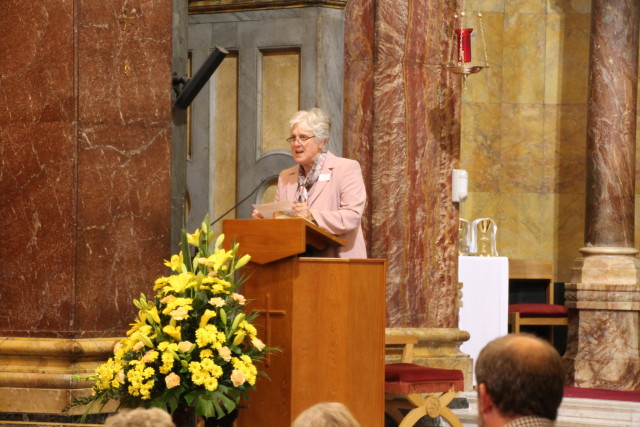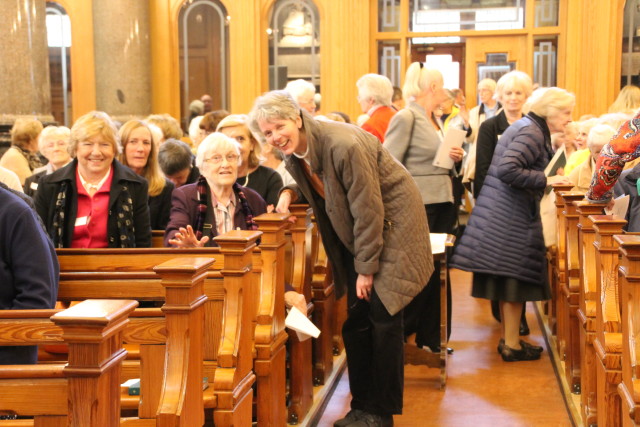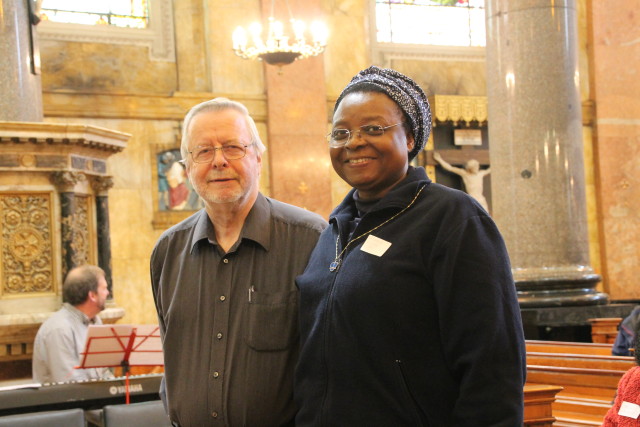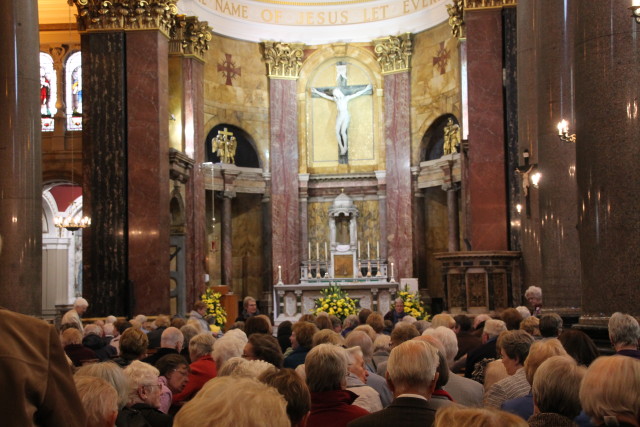The Mass to mark the closing of our community house in Preston and to celebrate the Society’s presence in the town since 1853 took place at St Wilfrid’s church on Thursday afternoon, 15 October. You can read Looking Back at 160 Years in Preston here. Below is the homily read at the Mass.
Preston celebration: Photo Gallery

Preston’s 162 Years
By Pauline Darby, SHCJ
Romans 8: 22-27 – Constitutions 1-4 (abridged) – John 15:1-8
The scripture readings we’ve just heard were for the feast of St Teresa of Avila. Both Teresa and Cornelia liked dancing, singing and playing the guitar. They also liked winning, Teresa at chess and Cornelia at card games! Both were strong women and forged new paths, responding to the needs of their time, the wants of the age as Cornelia called them, in the way they believed God was leading them. Teresa’s dictum, God alone, was a favourite of Cornelia’s.
On this October 15th, Teresa’s 500th anniversary is commemorated. On the same date in 1846 in Derby was the first celebration of Eucharist in a Holy Child convent. Just a few years later the fledgling community in Preston would have its own festivities. Now we gather to give thanks for 162 years of SHCJ life and service in this town.
Teresa and Cornelia spent their time opening houses and now the Society in this province is mostly closing them – unlike in West Africa where they are springing up. However, as someone remarked, “if, over one and a half centuries, you haven’t finished what you were meant to it’s (using a Lancashire turn of phrase) ‘a poor do’!”
Why have you come today? What is your connection with the Society? What memory do you treasure? Let it surface in your mind and heart…
Whatever else the Holy Child spirit might be about, it isn’t usually one of silent compliance, so as a way of sharing a life-giving word, as did the early Christians when they gathered for liturgy, I invite you to talk briefly about the memory with your neighbour…
I wonder what came to mind? I imagine it enfleshed an aspect of today’s readings. Was it about something coming to birth – perhaps a friendship, the awakening of an interest that became a career, companionship in some venture or other…? Whatever you shared, I hope it reminded you that God’s Spirit always wants to produce good fruit.
Fruitfulness is the theme of the gospel we heard. Vines, as you know well, aren’t a horticultural feature in Preston but Jesus’ metaphor is always worth exploring: ‘I am the vine and you are the branches’, words spoken to his disciples and to each one of us. Many years ago I went to Hampton Court. There, planted in 1769, is the oldest and longest (120 ft) grape vine in the world. It was pointed out to us that, in fact, a vine doesn’t have branches, rather it’s all one entity coming from the hidden roots, the point Jesus was getting at when he stressed the importance of not being cut off!

However, a significant amount of pruning has to happen if there is to be a good crop of grapes. Thanks to Google, I know that immediately after flowering the number of bunches are reduced and the remaining ones thinned. Later in the summer some leaves are removed to allow sunlight to fall upon the ripening fruit. In November and December, when the plant is fully dormant, the fruiting spurs are cut back to just one or two buds.
Pruning in our own lives is often painful as Cornelia herself experienced. Trying to come to terms with the consequences of Pierce’s desire for priesthood, she turned instinctively to this familiar metaphor (a word which means to carry or bear, over or across) to get her through such devastation. She wrote in her notebook, O my God, trim thy vine, but in thy great mercy root it not yet up.
It was the metaphor the Christian community recalled Jesus using on the eve of his passion, death and ultimate resurrection, trusting it would help carry his disciples and himself over the approaching trauma. If Jesus could not avoid death nor can we – whatever its form – and we cannot know in advance what resurrection might look like, what seeds planted could suddenly spring up. It’s a huge leap for the Society – and for many of us here in whatever the circumstances of our lives – to trust that our best work has probably not yet germinated; to live out the secret of such seeds to the end; to let go of what was fruitful in many ways and turn instead towards the as-yet-unrevealed promises of the risen Christ.

All we are told in the gospel is that we have to remain, but not by staying in one place. Rather we are to remain attentive, to remain attuned to the sometimes difficult call of God’s Spirit, to be willing to bear witness to divine love through, with, in, across and over the sorrows of life as well as its joys, as did Cornelia.
The tone or ‘song’ of this celebration is gratitude – gratitude for so many years here and for fruitful companionship; gratitude for opportunities and for shared labour in the vineyard; gratitude for times of growth and maybe, too, for moments when pruning has been a necessary grace; gratitude for a coming to know the Lord through each other.
I think Cornelia (and Teresa) would think this a fitting ending after 162 years: it’s sad but it’s real and, within the celebration of Eucharist, it expresses openness to God’s continuing action in our lives, it expresses faith, hope and love – which we are promised will last, will remain for ever. Amen.




Comments are closed.